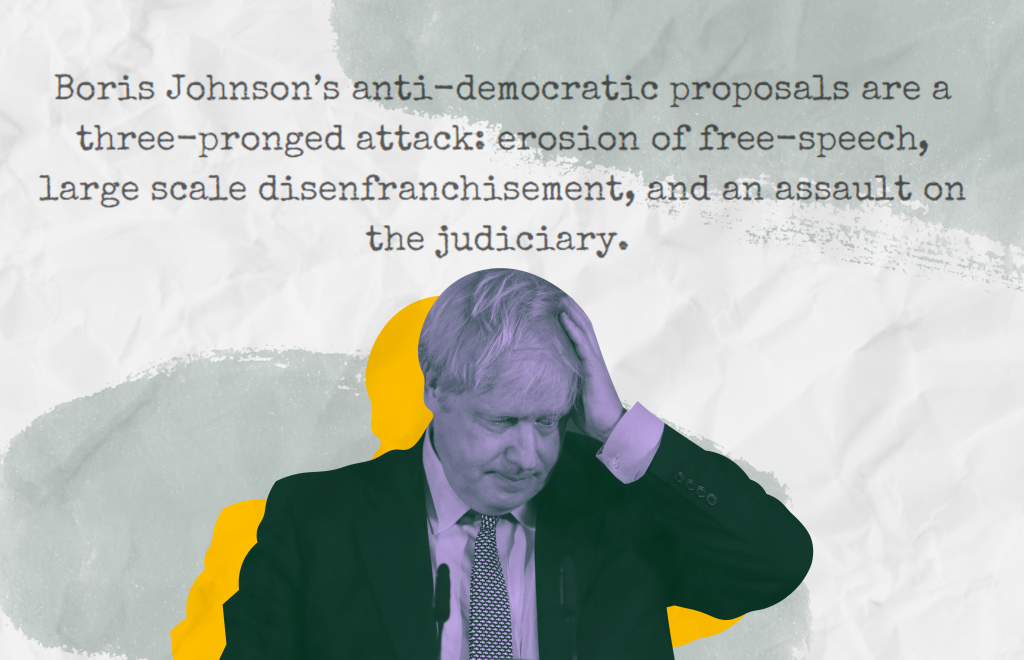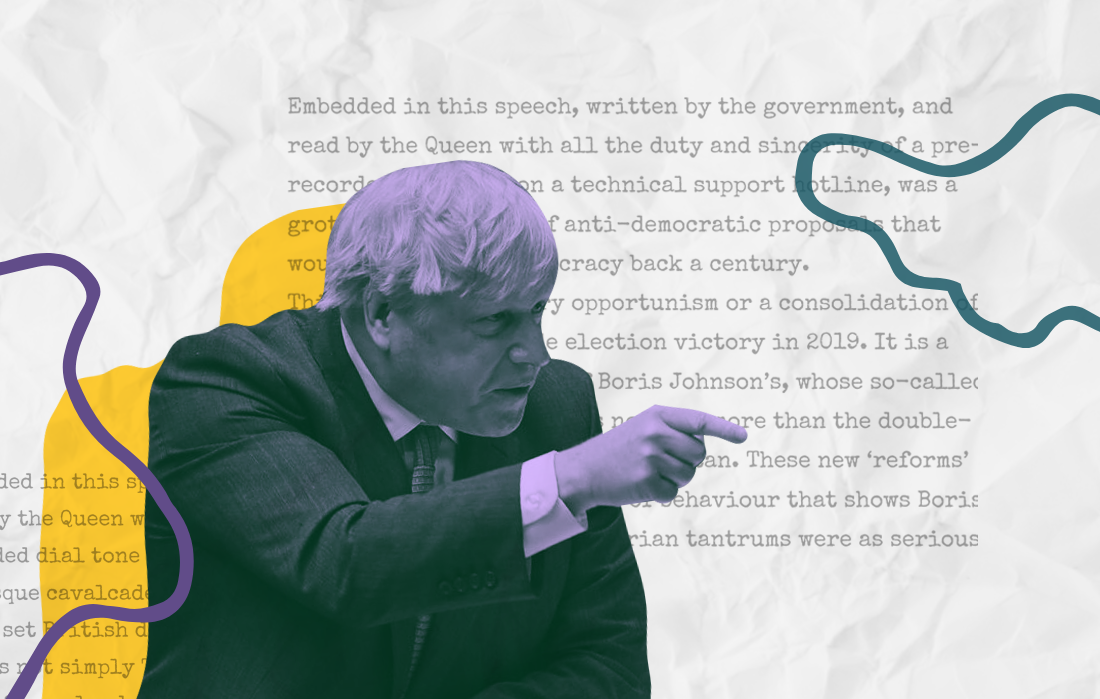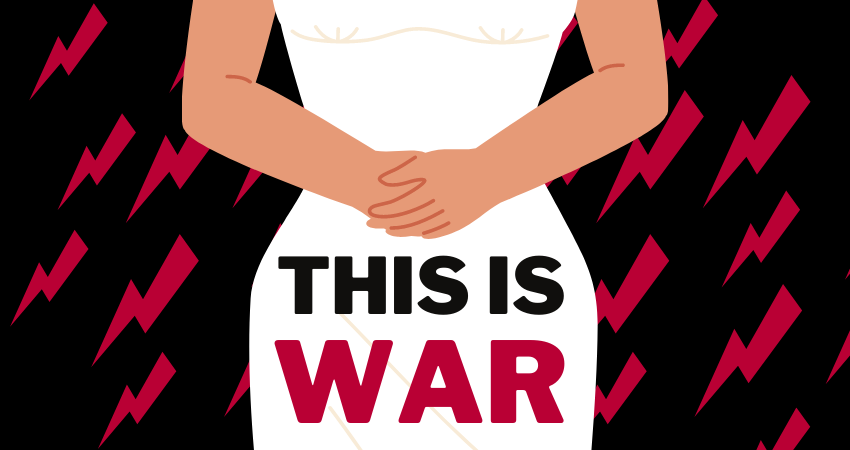The Queen’s speech to parliament has gone mostly unnoticed in the news cycle – drowned out by the noise from F35s and rocket fire in the Gaza strip. Embedded in this speech, written by the government, and read by the Queen with all the duty and sincerity of a pre-recorded dial tone on a technical support hotline, was a grotesque cavalcade of anti-democratic proposals that would set British democracy back a century.
This is not simply Tory opportunism or a consolidation of power from a landslide election victory in 2019. It is a longstanding ambition of Boris Johnson’s, whose so-called ‘social-libertarianism’ is nothing more than the double-speak of a pseudo-populist charlatan. These new ‘reforms’ make up an alarming pattern of behaviour that shows Boris Johnson’s years of authoritarian tantrums were as serious as a heart attack.
Boris Johnson’s anti-democratic proposals are a three-pronged attack: erosion of free-speech, large scale disenfranchisement, and an assault on the judiciary.
Much attention has been placed over the last three months on the Police, Crime, Sentencing and Courts Bill – but not nearly enough. It is no understatement to say that this Bill presents the most serious challenge to British democracy in a generation. In a climate where BLM campaigners chanting ‘defund the police’, and peaceful vigil-goers are brutalised for attending a memorial for Sarah Everard – a woman allegedly murdered by a police officer, it would appear that this Bill to strengthen police powers is disconnected from growing public resentment of the police.
This Bill would make any protest, even single-person or small ‘static protests’ valid targets for police action, where before only large marches could be. Furthermore, police can stop protests for being too noisy. If this were not already Kafkaesque enough, it is of course the point of a protest to be noisy and disruptive, and the discretion for what is defined as noisy lies solely with the Home Secretary. Priti Patel can exercise her discretion through a statutory instrument without the approval of Parliament – thereby making her the ultimate arbiter of what is and is not acceptable protest.
The Bill would also expand the definition of nuisance to include annoyance or ‘risk of annoyance’, punishable by a maximum sentence of up to ten years. It would make defacing or damaging a statue or monument punishable by a custodial sentence of up to ten years – where previously it had been 3 months. Since the toppling of slave-trader Edward Colston’s statue in Bristol last year this has been favourite pet hate of Conservative flag-waving ‘patriots’. Tories, who feel that British values such as freedom, justice and democracy must be protected by a decade long prison sentence for people convicted of simple criminal damage.

It is worth taking a moment to acknowledge the existential threat this Bill places on the Traveller community by allowing police to arrest and remove Travellers if the police suspect they might do something illegal. This is a well-trodden path of autocrats seeking to slowly encroach on people’s right to move freely or exist nomadically by using a pariah group as a political pawn.
This Bill would make protesting a crime. Protest is an essential right afforded to citizens of a free and fair society. It is the most basic form of holding a government to account by way of grass-roots activism. The aim of which is to garner public attention and to make the government feel inconvenienced, disrupted, or even God forbid – annoyed. Without a robust right to protest, the government alienates the governed and strips them of consent.
If this Bill were to become law, it would be the end of the public’s ability to air their legitimate grievances with a government run amok. It would be the end for BLM’s drive towards racial justice, Extinction Rebellion’s campaign for a liveable planet, women to Take Back the Night, and for Stop the War to stand up for the peace and security of Palestine. Let this serve as a warning, that if this Bill becomes law, it will not only affect us now, but guarantee that future transgressions by the government will go unaccounted for.
The great irony of this is that Boris Johnson is often seen as an advocate for free expression; he has carefully crafted a libertarian persona that whole-heartedly supports the free exchange of ideas. His infamous column, which compared Muslim women to ‘letterboxes’ and ‘bank robbers’, was expertly brushed off as a defence of liberalism – a call to women everywhere to wear what they chose to. He is often seen on the front lines of the so-called culture wars, criticising the ‘woke brigade’ for cancel culture and no-platforming in the name of free speech and liberal democracy. This is nothing more than a cynical gammon-baiting façade.
The Queen’s speech contained planned legislation to impose sanctions on universities that no-platform speakers. An apparent win for the ‘party of free speech’, a claim that somewhat loses its lustre when confronted with reality. Tories are the party that implemented the Prevent strategy – which has its own list of blacklisted speakers, passed the Investigatory Powers Act often referred to by civil liberties groups as a ‘snooper’s charter’, and outlawed the use of anti-capitalist materials in schools due to their ‘political extremism’.
This trend of fake populist outrage on behalf of free expression only happens when it goes in favour of the Conservatives – of course it is easy to oppose no-platforming, the likely targets are right-wing hate merchants and racist snake-oil salesmen. Seldom will you see the free speech extremists come to the defence of a cause that does not directly affect them. This hypocrisy is quintessential Boris Johnson. Free speech champion when he’s penning racist articles in the Telegraph, tin-pot dictator threatening to withdraw Channel 4’s broadcasting licence for empty-chairing him. Boris Johnson routinely lies in the commons, breaks the ministerial code, runs away from news cameras; he has threatened to make it illegal for public bodies to boycott countries that engage in human rights abuses and, one last time for the people at the back, is currently trying to make protests illegal.
Johnson’s second prong comes in the form of the euphemistically named Electoral Integrity Bill, which would mandate anyone wishing to vote produce a valid form of identification to cast a ballot. This is not a new idea; it was proposed by Tony Blair’s Labour government in 2004 as part of a wider national ID scheme, to which Boris Johnson commented:
If I am ever asked, on the streets of London, or in any other venue, public or private, to produce my ID card as evidence that I am who I say I am, when I have done nothing wrong and when I am simply ambling along and breathing God’s fresh air like any other freeborn Englishman, then I will take that card out of my wallet and physically eat it in the presence of whatever emanation of the state has demanded that I produce it.
Newton’s third law of politics: for every Johnson policy there is an equal and opposite Telegraph article.
This proposal is a mechanism of voter suppression. It targets first-time voters who are mostly young and much more likely to vote Labour. It prejudices against those who do not hold a valid form of state ID such as a driving licence or passport, which the Electoral commission estimates is around a quarter of the electorate. These people are overwhelmingly young, poor, and racially diverse and who, in yet another stunning coincidence, are more likely to vote against the Conservatives.
Even the stated reasoning is plucked out of the Donald Trump playbook. Supposedly done in the name of ‘preventing voter fraud’, of which in the last general election year there were only six counts. To review, a quarter of the electorate is approximately eleven million people. Can Johnson perform simple mathematics? Is he aware that eleven million (11,000,000) is a larger number than six (6)? A reasonable question, given that neither he nor Carrie Simmonds seems able to work out £150,000 is more than £30,000.
Of course, Johnson is aware that voter fraud is not a real issue, he has simply sought to replicate the fervour of MAGA cultists in the US. Siding with cranks who are convinced that Joe Biden won the presidency with the assistance of illegal immigrants, Venezuelan voting software, and Antifa. The incidences of voter fraud are not enough to impact the outcome of an election, even if they were all conducted in the same constituency for the same election (except perhaps North East Fife, which the SNP won by two votes in 2017). Eleven million is, however, enough to swing a national election. Even if only a fraction of this figure were truly disenfranchised it means that many marginal seats would be won by stolen votes.
The Election Integrity Bill makes up only a part of Johnson’s wider campaign against voting rights. Last year the Conservatives rushed through the Parliamentary Constituencies Act, allowing for the most flagrant partisan gerrymandering. Johnson announced plans to repeal the Fixed Term Parliament Act allowing him to call General Elections at politically convenient moments and easily untangle the government from Parliamentary deadlocks. In 1976, Lord Hailsham popularised the phrase ‘elective dictatorship’ to describe the feeble checks and balances in the British government. The ease in which Johnson has been able to purge unfavourable voters, redraw districts and pluck election dates out of the air demonstrates just how fragile the word ‘elective’ really is.
The final arm of Boris Johnson’s campaign is the most clandestine. For the most part, people simply do not care about courts or the judiciary. It is generally considered complex, inaccessible, and elitist – all of which is unfortunately true. While the UK media continues to shy away from news that does not immediately engage our Pavlovian reward system, chances of ever hearing much about this story outside of legal journals is slim to none.
Judicial Review, put simply, is the process by which courts can examine the use of any authority granted by an Act of Parliament or that exercises a government function.[1] It is an essential feature of a common-law system and a pillar of the democratic oversight performed by the court. It is a tool used to ensure government bodies can be held accountable and guarantee they are acting in accordance with the powers granted by Parliament. It is a safeguard of Parliamentary sovereignty to ensure that the will of the legislature is not being undermined by the executive.
Boris Johnson has already been stung by the cold magisterial pincer of the Supreme Court, who unanimously decided in 2019 that his prorogation of Parliament was an unlawful exercise of Royal Prerogative.[2] For their efforts, all eleven Lord Justices were smeared by the tabloid press for upholding the constitutional principle of Parliamentary sovereignty. Johnson is keen not to have this embarrassing incident repeated, should he ever want to attempt further law-breaking.
While little is yet known about the exact nature Johnson’s reforms will take, there are a few obvious adjustments he would like to make to the judiciary. The first of these is armouring ouster clauses from unfavourable interpretation. Ouster clauses are phrases that Ministers sometimes insert into legislation that read something like “this section of the Act cannot be challenged in any court of law”. While this seems unambiguous, the last 30 years of precedent is that these clauses are not capable of preventing a challenge on the grounds of Judicial Review[3] – much to the chagrin of government officials. The argument goes that the legislature could not have meant to exclude a challenge under Judicial review, as that would limit the Parliament’s ability to ensure the faithful execution of its will by the government. Thus, the game of cat and mouse began.
Boris Johnson has also tried to sneak such features into legislation which he anticipated would suffer the righteous indignation of the Bench – such as the Internal Markets Act, with its “mother of all ouster clauses”. This act was so controversial that it managed to contravene the constitutional trifecta of the Human Rights Act, the Good Friday Agreement, and the anticipated Brexit Withdrawal Bill. Often in such cases, where an Act of Parliament contradicts an Act of constitutional importance the ‘lesser’ Act is implicitly repealed and ceases to be enforceable.[4] In this case however, this would have been impossible, and the legislation would have been permitted to destabilise Britain’s constitutional bedrock and international obligations.
Luckily, Johnson’s Internal Market’s Bill was so extreme that the Lords withdrew many of the more outrageous provisions. Yet the message of this saga is a chilling one. If Johnson can strip away the ability of courts to place proper and reasonable limits on the government’s power to enforce the laws of the UK, then the Rule of Law is not simply broken, but becomes putty in the Prime Minister’s hands.
These deep-seated authoritarian tendencies that manifest into dangerous autocratic policy are a result of a consequence free life, made up of privilege, entitlement, and hubris.
Judicial Review is one of the most important safeguards democracy has. It is responsible for exposing Matt Hancock for unlawfully failing to disclose government contracts. It was the reason frontline NHS staff were able to challenge the government over embarrassing PPE shortages. It allowed the reversal of an immigration policy that unfairly targeted Ghurkha’s seeking settlement in the UK, and it ensured that the notorious ‘black cab rapist’ did not walk free. Most crucially, it ensures that will of Parliament is not subverted by faceless government bureaucrats, given carte blanche to act far beyond the scope of their authority.
Progressive pundits have been pointing out Boris Johnson’s hypocrisy and loose relationship with the truth for decades. Yet even now most of the mainstream media continues to act as Johnson’s Praetorian guard – refusing to report his racism, incompetence, and lies. What often falls under the radar, even in left-leaning circles, is the Prime Minister’s sheer disdain for any accountability or oversight. These deep-seated authoritarian tendencies that manifest into dangerous autocratic policy are a result of a consequence free life, made up of privilege, entitlement, and hubris. His is a lifetime of stumbling from one chaotic blunder to another and constantly failing upwards. He has never had anybody tell him no.
Proper scrutiny was not placed on Johnson when he became Prime Minister in July 2019. The media refused to expose his many flaws in the December general election. Instead focusing their ire on the candidate warning of the danger a far-right populist would bring to a Conservative party that had lost its mind. The above examples only serve as a tiny microcosm for the multiple ways Boris Johnson has sought to disable the guardrails of British government in an ill-conceived effort to pander to his own fragile ego. Twisting freedom of speech into a catch-all defence of any criticism, en mass voter suppression against unfavourable demographics and an undercover neutering of the judiciary. These are only this week’s taste of dictatorship that the British public must be vigilant of – lest we quickly fall into an authoritarian government led by an out of touch elitist that speaks only in three-word slogans.
Dane Harrison is a trainee solicitor with a BA Theology from the University of Exeter.
Twitter: @rexdane
Book: The Four Horsemen
Citations
Legislation:
Police, Crime, Sentencing and Courts HC Bill (2019-2021) [268] – https://publications.parliament.uk/pa/bills/cbill/58-01/0268/200268.pdf
Single-person protests – s. 60
Static protests – s. 54-55
Public Nuisance – s. 59
Criminal damage of memorials – s. 46
Unauthorised encampments – s. 61
Noise – s. 54
Secretary of State may define “serious disruption” – s. 54
Investigatory powers Act 2016 – https://www.legislation.gov.uk/ukpga/2016/25/contents/enacted
Parliamentary Constituencies Act 2020 – https://www.legislation.gov.uk/ukpga/2020/25/contents/enacted
Fixed-term Parliament Act 2011 – https://www.legislation.gov.uk/ukpga/2011/14/contents/enacted
Internal Markets Act 2020 – https://www.legislation.gov.uk/ukpga/2020/27/contents/enacted
Human Rights Act 1998 – https://www.legislation.gov.uk/ukpga/1998/42/contents
Good Friday Agreement – https://assets.publishing.service.gov.uk/government/uploads/system/uploads/attachment_data/file/136652/agreement.pdf
European Union (Withdrawal Agreement) Act 2020 – https://www.legislation.gov.uk/ukpga/2020/1/contents/enacted
[1] R v Panel on Take-overs and Mergers, ex parte Datafin plc [1987] QB 815
[2] R (Miller) v The Prime Minister [2019] UKSC 41
[3] Anisminic Ltd v Foreign Compensation Commission [1969] 2 AC 147
[4] Ellen Street Estates v Minister of Health [1934] 1 KB 590






